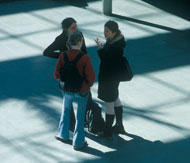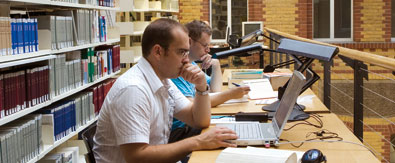University teaching in the digital age
First of all, digitization is not only altering the way people access and process information and how they communicate, it is also bringing about changes in professions and jobs and shifting the frontiers between the various spheres of life. This inevitably affects the way we learn and must therefore have consequences for teaching.
Numerous questions arise concerning university teaching, such as how to convey knowledge and information in an appropriate way when information is readily available in digital form everywhere and at any time. Which qualifications and skills do students need to be able to process content and different ways of thinking in this context (“digital literacy”)? How relevant is university teaching when students have access to competing sources of information and means of communication anywhere and at any time? How do students who have been used to communicating in abbreviated language via digital platforms since a young age and whose attention quickly leaps from one topic to another learn to write and communicate? Which forms of learning and teaching formats are promising in view of students’ learning and communication habits, in other words how can learning objectives be achieved?
In the context of higher education, “digitization” usually means the use of digital tools in teaching. This risks neglecting the issue of how learning and teaching are changing and need to change in view of social developments in the digital age. At the same time, the impression is created that decisions on which media to work with and which competence goals teaching aims to achieve is a matter of individual taste and inclination. In contrast, Viadrina regards a strategic debate and a strategic approach to the challenges that the digitization of society presents for university teaching as an opportunity to strengthen its own profile.
Viadrina has positioned itself as a place of excellent teaching which focuses on achieving specific learning goals. Student feedback in numerous internal and external evaluations has shown that the high degree of student satisfaction is closely linked with the high-quality and intensive on-site support and the direct contact with teaching staff. This reflects a key aspect of study at university and especially at Viadrina, namely learning as a social experience. Direct personal communication and attendance are essential elements of successful learning.
University teaching takes place mainly in lectures, seminars and project-based groups which present very different opportunities and challenges. Seminars requiring attendance are partly faced with problems such as lack of preparation and passivity on the part of students. However, lectures often deal with similar content so that the function of lecturers is in danger of being limited to the preparation of a format for presenting knowledge while students risk missing out on critical reflection and knowledge production. The use of digital teaching media to supplement the analogue lecture theatre or seminar room is one of several ways of dealing with such opportunities and challenges and of creating an inclusive and readily accessible environment suited to a variety of learning styles and needs.
Changes in information and communication behaviour not only render it necessary to examine traditional forms of teaching. Digital information and communication tools also provide opportunities to reflect on the role of teachers and how they relate to students and to structure teaching in a way that is more student-centred, more stimulating and more flexible. Thus digitization also provides opportunities to address the needs of an increasingly heterogeneous body of students and educate students to think and act independently and with foresight. At the same time, it is an opportunity to provide both analogue and digital spaces for reflection and learning which enable time, slowness and concentration to be experienced productively.



